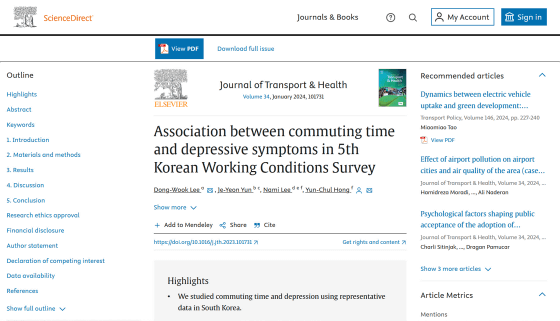Research results show that long commutes are associated with deterioration of mental health

Many people think that commuting time should be as short as possible, but due to factors such as rent and living conditions, long commutes may be unavoidable. A South Korean research team conducted a study of more than 23,000 people and found that people who commute for more than an hour were 16% more likely to experience depressive symptoms than those who commute for less than 30 minutes. 'The result was shown.
Association between commuting time and depressive symptoms in 5th Korean Working Conditions Survey - ScienceDirect

Commuting over 60 minutes increases depression risk by 1.2 times: study < Hospital < Article - KBR
https://www.koreabiomed.com/news/articleView.html?idxno=22721
Massive Study Finds a Link Between Commuting And Poor Mental Health : ScienceAlert
https://www.sciencealert.com/massive-study-finds-a-link-between-commuting-and-poor-mental-health
In recent years, multiple studies have shown that long commutes have various negative effects on people's minds and bodies. For example, research shows that people who spend more than five hours a week commuting are more likely to have physical inactivity and sleep problems, and that a 20-minute increase in commuting time is associated with a 19% decrease in job satisfaction and a 19% decrease in pay. Research has shown that the reduction is as much as 'doing.'
South Korea is said to have the longest average commuting time among the OECD (Organization for Economic Co-operation and Development) countries, and the highest proportion of people with depressive symptoms. A research team from Inha University and Seoul National University investigated the relationship between commuting time and depressive symptoms.
The data used in this study was collected in the 5th Korean Labor Status Survey conducted in 2017. The research team surveyed 23,415 salaried workers aged 20 to 59, including commuting time, depressive symptoms, gender, age, educational background, income, place of residence, marital status, parental status, occupation, weekly working hours, We analyzed items such as the presence or absence of shift work.
The average commuting time of the subjects was 47 minutes per day, and if they worked 5 days a week, the commuting time per week was about 4 hours. Also, of the 23,415 people who responded to a questionnaire based on the WHO Well-being Index, a quarter reported experiencing depressive symptoms.

The analysis found that people who commute for more than an hour a day were 16% more likely to experience depressive symptoms than those who commute for less than 30 minutes. Additionally, the relationship between long commutes and deterioration of mental health is stronger for men who are unmarried, work more than 52 hours a week, and have no children, and for women, those who are low-income, work shifts, and have two or more children. It is reported that it was strong.
'When you're short on time, you may not have enough time to reduce stress or cope with physical fatigue through sleep, hobbies, or other activities,' the researchers said.
Although this study does not consider that ``depressive symptoms cause long commutes,'' it does not indicate a causal relationship between commuting time and depressive symptoms. In addition, although factors such as age, weekly working hours, income, occupation, and presence of shift work were considered, some risk factors related to depressive symptoms, such as genetic factors, could not be analyzed. Still, the study's finding that longer commutes are associated with worse mental health echoes what many people feel.
The data used this time does not include how the subjects commuted to work. However, in the past,
The research team said, ``Reducing travel time and travel distance through improved transportation options may improve people's commuting environment and improve their health status.''

Related Posts:
in Science, Posted by log1h_ik







